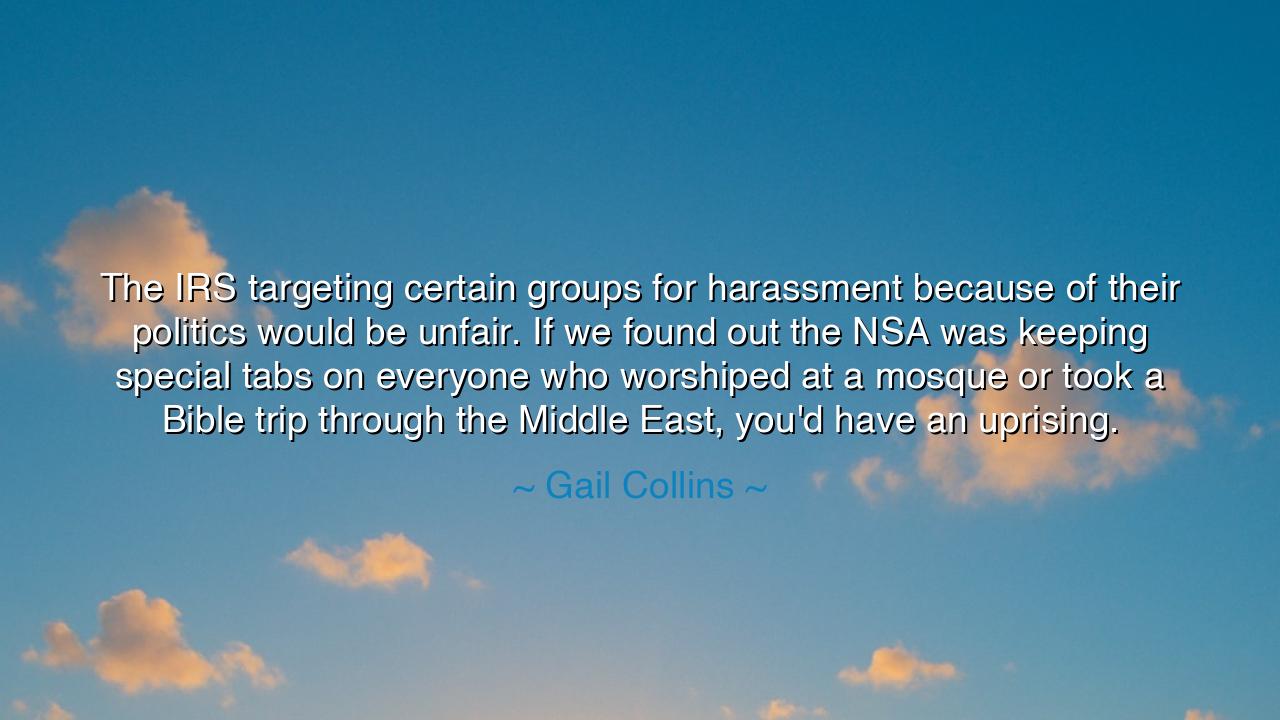
The IRS targeting certain groups for harassment because of their
The IRS targeting certain groups for harassment because of their politics would be unfair. If we found out the NSA was keeping special tabs on everyone who worshiped at a mosque or took a Bible trip through the Middle East, you'd have an uprising.






"The IRS targeting certain groups for harassment because of their politics would be unfair. If we found out the NSA was keeping special tabs on everyone who worshiped at a mosque or took a Bible trip through the Middle East, you’d have an uprising." Thus wrote Gail Collins, unveiling a warning as old as tyranny itself: that when the guardians of law and state become persecutors, justice dies and rebellion awakens. For power misused against conscience, faith, or belief is not strength but poison, and the people will not drink it long without revolt.
The ancients knew this truth well. Rome endured when her laws bound both citizen and consul, but when emperors turned their spies upon the people, suspicion rotted the empire from within. To use the arm of the state not for order but for harassment is to light a slow fire beneath the throne. History teaches that when rulers mock fairness, the governed become restless, and when faith itself is watched with hostility, the soul of the people rises in wrath.
Consider the story of the American Revolution. At first, the colonists bore taxation and burdens with patience, but when they felt singled out, watched, and stripped of dignity, their loyalty withered. The British crown, instead of guiding with fairness, pried too deeply into their commerce and assemblies. The result was not obedience but uprising—the cry of liberty that shattered empire. Thus Collins’ words echo the same warning: politics twisted into persecution creates not submission but rebellion.
So too in more recent memory, the civil rights movement revealed the same pattern. When leaders and communities were spied upon, threatened, and harassed, they did not bend in fear—they rose in moral strength. The uprising came not from violence but from the righteous refusal to be silenced. The lesson resounds: unjust scrutiny of faith or politics may quiet a few, but in time it stirs the many to awaken.
Therefore, let this truth endure: institutions of state must guard fairness as their highest trust. To twist them into weapons against belief or dissent is to strike at the very heart of liberty. For the people may endure taxes, burdens, and even poverty—but they will not long endure injustice. And when the watchers themselves become oppressors, the eyes of the people blaze with fire, and an uprising becomes not only possible but inevitable.






GGiang
On national programs, I keep a timeline in mind: courts questioned bulk phone-metadata collection and Congress replaced it with a narrower regime that pushed queries to providers. For me, that’s proof change is possible when scrutiny is sustained. What’s the healthiest stance now—assume tools can be re-scoped again, and insist on measurable safeguards before renewal? I’d appreciate a citizen’s checklist for surveillance debates: what ended, what persists, what empirical benefits exist, and what rights costs remain.
VNAnh Khoa Vu Nguyen
Religious profiling corrodes both safety and cohesion. Local examples show how broad surveillance of Muslim communities chilled ordinary life while producing little actionable intelligence. What alternative approaches preserve dignity and still reduce risk—community partnership units with transparent metrics, tip-driven investigations with judicial predicates, and post-operation audits published by default? I’d like guidance on how residents can evaluate their city’s practices beyond slogans and headlines. Evidence-based policing should have evidence; if it doesn’t, that’s its own red flag.
HNHai Nguyen
Targeting in tax enforcement should be about behavior, not ideology. When criteria creep toward names or viewpoints, legitimacy craters. What safeguards ensure screening rules stay content-neutral—version-controlled checklists, red-team legal reviews, and external audits that publish summaries? If an internal watchdog flags problems, how should agencies communicate fixes to rebuild trust with affected groups? I’m looking for a playbook that pairs technical controls with public accountability so we don’t repeat past mistakes in exempt-status reviews.
GBNguyen Huy Gia Bao
History warns that “trust us” ages poorly. The Church Committee documented how multiple agencies overstepped, reshaping today’s oversight architecture. If that’s our cautionary baseline, what modern equivalents prevent quiet drift—regular declassifications, IG reports with teeth, adversarial amici in secret courts, and automatic public summaries unless a judge explains why not? I’d like a rubric for when those tripwires are failing so citizens can escalate concerns before abuses harden into norms. What would a 21st-century version of that investigation look like in practice?
NDNguyen Dan
Oversight is only real if it’s knowable. For foreign-intelligence collection, what should we expect to see in public about targeting, minimization, and querying rules—and what must remain secret? I’m looking for a plain-English briefing that explains how certifications get reviewed, what the guardrails are for incidentally collected U.S. person data, and how compliance is audited across agencies. Then, how might civilians track renewal milestones and file meaningful comments before sunsets come due? A transparency map would help me monitor, not just fret.